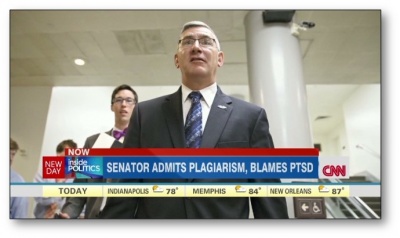Difference between revisions of "John Walsh Thesis Revision"
(→Page 9) |
(→Page 1) |
||
| Line 14: | Line 14: | ||
= Page 1 = | = Page 1 = | ||
| + | During George W. Bush's time as president, few believed that he would focus on the advancement of democracy. During 2001, the Bush administration did not even address the issue of promoting civil societies, rule of law, free elections and open political processes as major issues of their agenda. Early on, Bush and his team made it evident that they would not put heavy emphasis on fostering democracy, but rather they would focus on "great-power realism." | ||
| + | In Bush's next term, he began by expressing that there would be a great focus on foreign policy through a large push toward achieving world peace. | ||
= Page 2 = | = Page 2 = | ||
Revision as of 07:58, 11 April 2019
This page is an exercise in revising a massively plagiarized master's thesis by paraphrasing portions of the text that were either quoted without attribution (no citation) or quoted inappropriately (no quotation marks). In both cases we will re-write individual paragraphs and deposit the results here, by page number.
Here is a link to the New York Times article.
Instructions:
- Type on your personal notebook a piece of text (paragraph) from the page represented in the New York Times article of July 23, 2014.
- Edit to rephrase in your own words, avoiding close paraphrasing as much as possible.
- Cut and past results into this document on the proper page in the proper order, if possible.
- Do minor formatting or editing as needed.
- BONUS. If you are editing a passage without attribution, insert the reference.
Contents
Page 1
During George W. Bush's time as president, few believed that he would focus on the advancement of democracy. During 2001, the Bush administration did not even address the issue of promoting civil societies, rule of law, free elections and open political processes as major issues of their agenda. Early on, Bush and his team made it evident that they would not put heavy emphasis on fostering democracy, but rather they would focus on "great-power realism." In Bush's next term, he began by expressing that there would be a great focus on foreign policy through a large push toward achieving world peace.
Page 2
Page 3
Page 4
The Links between Democracy and Security
In 1994 the Clinton administration endorsed and adopted the idea that there is a link between democracy and security. [23] In his 1994 State of the Union address President Clinton declared that "ultimately the best strategy to insure our security and to build a durable peace is to support the advance of democacy elsewhere." [24] A year earlier, Anthony Lake, then President Clinton's assistant for national security affairs, had called for replacing the Cold War strategy of containment with a "strategy of enlargement - enlargement of the world's community of market democracies." [25]
President Bush throughout his presidency has also consistently argued that there is an inextricable link between freedom and peace, and between democracy and security.
The Bush administration and its defenders contend that the push for Arab democracy in the Middle East will not only spread American values but also improve U.S. security. As democracy grows in the Middle East, the thinking goes, the region will stop generating anti-American terrorism. Promoting democracy in the Middle East is therefore not merely consistent with U.S. security goals; it is necessary to achieve them. [26]
Page 5
Page 6
area will cease to create anti-American terrorism. President Bush has confidence that furthering and encouraging democracy in the Middle East, not only coincides with the goals of U.S. security, but is crucial to achieve these goals.
Page 7
Page 8
Page 9
For this effort, Arab leader and Arab democracy reformers from the United States, Europe and India must work together.
Arab Support for Democracy
Since the 1970's "third wave" of democratization, a myriad of countries have been observed to have a surge of governmental democratic structures. Democracy in the middle east in no different follows this observable trend.

